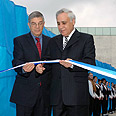
Don’t touch my Holocaust
Cheapening of the Holocaust is also evident in our common use of it
The inauguration of the new Yad Vashem museum in Jerusalem was an impressive occasion and the museum itself is an important contribution to the perpetuation of the Jewish people’s tragedy.
However, in the arguments that surrounded the inauguration ceremony and in the ensuing debate over what the museum offers and what it doesn’t, there were signs of the old Israeli battle that can be termed “don’t touch my Holocaust.”
It was feared that a Japanese representative would mention the victims of the atomic bombs that fell on Hiroshima and Nagasaki in his speech and so he was not invited to the ceremony.
Moreover, judging by the Israeli memorial institution's treatment of other tragedies, one could be led to believe that Israel growls in protest over the slightest hint that its exclusivity over the Holocaust may be undermined.
“When France compares the Holocaust with Rwanda and Kosovo,” said the president of the World Jewish Congress Israel Singer, “the chairman of the French Holocaust Fund, who herself is a Holocaust survivor, speaks out against the comparison. It’s not at all certain that the person replacing her in the future would take the same approach.”
What is this approach? The approach says that the Holocaust is a singular event, because it was a planned genocide of an entire people, carried out with meticulous bureaucracy by an advanced Western country.
It can’t even be compared to other incidents where millions were massacred, beginning from the genocide of the Armenian people to the events in Africa in recent years.
But beyond this approach there is something that is not aimed at perpetuating the memory but rather at looking to the future. The uniqueness of the Holocaust has consistently served Israel to justify major and minor acts.
From its nuclear project to its aggressive military operations, from the demand for political forgiveness toward its policies and up to its moral judgment, Israel has taken (or some of its leaders) the stance of “we are allowed to because we were victims of the Holocaust.”
Cheapening of the Holocaust is not only expressed by forgetting or anti-Semitism from the outside, it is also apparent in our common use of it. Anyone opposed to Israel’s policies is Hitler; anyone who is not an admirer of ours is anti-Semitic.
The lesson spread and cultivated by the establishment, from within and from without is not based on the saying the Holocaust is proof of the infinite potential of evil hidden in mankind and thus forces us to fight it; but rather that we deserve it because we were its victims.
In this sense, it is unfortunate that the discussion surrounding the inauguration of the new museum was also dragged into the realm of “whose Holocausts is greater”.
Comparing the Holocaust to another historical event doesn’t necessarily detract from the tragedy or make us forget it.
And the statement that should be issued by Israel, because many of the survivors have made it their home, and a major part of its justification emanated from the statement of never again, the Holocaust does indeed need to be a tragedy whose extent and lessons are universal.
Its memory forces us to be more humane, more sensitive to injustice, more apprehensive towards evil – everywhere, and not only to the evil that threatens us.










